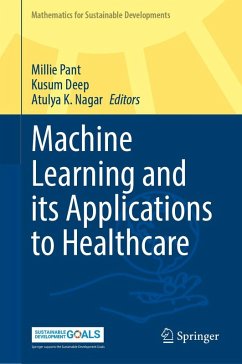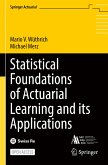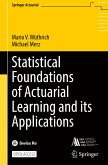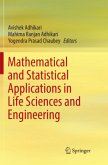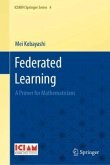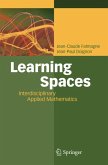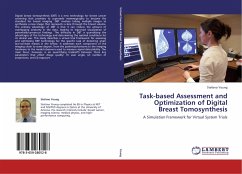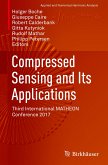Machine Learning and its Applications to Healthcare
Herausgeber: Pant, Millie; Nagar, Atulya K.; Deep, Kusum
Machine Learning and its Applications to Healthcare
Herausgeber: Pant, Millie; Nagar, Atulya K.; Deep, Kusum
- Gebundenes Buch
- Merkliste
- Auf die Merkliste
- Bewerten Bewerten
- Teilen
- Produkt teilen
- Produkterinnerung
- Produkterinnerung
This book offers a comprehensive collection of 36 research contributions on the transformative role of soft computing techniques such as fuzzy logic, neural networks, genetic algorithms, and hybrid methodologies in solving complex problems in healthcare. By aligning its themes with Sustainable Development Goals (SDG 3: Good Health and Wel-Being), the book offers a comprehensive analysis of how these technologies are being integrated into medical diagnosis, predictive modeling, disease classification, personalized medicine and healthcare management. Through an exploration of current trends,…mehr
Andere Kunden interessierten sich auch für
![Statistical Foundations of Actuarial Learning and its Applications Statistical Foundations of Actuarial Learning and its Applications]() Mario V. WüthrichStatistical Foundations of Actuarial Learning and its Applications32,99 €
Mario V. WüthrichStatistical Foundations of Actuarial Learning and its Applications32,99 €![Statistical Foundations of Actuarial Learning and its Applications Statistical Foundations of Actuarial Learning and its Applications]() Mario V. WüthrichStatistical Foundations of Actuarial Learning and its Applications38,99 €
Mario V. WüthrichStatistical Foundations of Actuarial Learning and its Applications38,99 €![Mathematical and Statistical Applications in Life Sciences and Engineering Mathematical and Statistical Applications in Life Sciences and Engineering]() Mathematical and Statistical Applications in Life Sciences and Engineering68,99 €
Mathematical and Statistical Applications in Life Sciences and Engineering68,99 €![Federated Learning Federated Learning]() Mei KobayashiFederated Learning106,99 €
Mei KobayashiFederated Learning106,99 €![Learning Spaces Learning Spaces]() Jean-Claude FalmagneLearning Spaces129,99 €
Jean-Claude FalmagneLearning Spaces129,99 €![Task-based Assessment and Optimization of Digital Breast Tomosynthesis Task-based Assessment and Optimization of Digital Breast Tomosynthesis]() Stefano YoungTask-based Assessment and Optimization of Digital Breast Tomosynthesis39,99 €
Stefano YoungTask-based Assessment and Optimization of Digital Breast Tomosynthesis39,99 €![Compressed Sensing and Its Applications Compressed Sensing and Its Applications]() Compressed Sensing and Its Applications83,99 €
Compressed Sensing and Its Applications83,99 €-
-
-
This book offers a comprehensive collection of 36 research contributions on the transformative role of soft computing techniques such as fuzzy logic, neural networks, genetic algorithms, and hybrid methodologies in solving complex problems in healthcare. By aligning its themes with Sustainable Development Goals (SDG 3: Good Health and Wel-Being), the book offers a comprehensive analysis of how these technologies are being integrated into medical diagnosis, predictive modeling, disease classification, personalized medicine and healthcare management. Through an exploration of current trends, research advancements and practical implementations, the book demonstrates the immense potential of soft computing to improve healthcare outcomes. It features a wide array of applications, including diagnostic systems for diseases such as cancer, Alzheimer's and cardiovascular conditions, as well as personalized treatment recommendations, patient monitoring systems and medical image analysis. It is aimed at researchers, practitioners and healthcare professionals, seeking to explore and apply advanced computational techniques to the medical field, providing both theoretical insights and practical applications.
Produktdetails
- Produktdetails
- Verlag: Springer Singapore / Springer-Verlag GmbH
- Artikelnr. des Verlages: 89582572
- Seitenzahl: 517
- Erscheinungstermin: 9. Februar 2026
- Englisch
- ISBN-13: 9789819548309
- ISBN-10: 9819548306
- Artikelnr.: 75690188
- Herstellerkennzeichnung
- Springer-Verlag GmbH
- Tiergartenstr. 17
- 69121 Heidelberg
- ProductSafety@springernature.com
- Verlag: Springer Singapore / Springer-Verlag GmbH
- Artikelnr. des Verlages: 89582572
- Seitenzahl: 517
- Erscheinungstermin: 9. Februar 2026
- Englisch
- ISBN-13: 9789819548309
- ISBN-10: 9819548306
- Artikelnr.: 75690188
- Herstellerkennzeichnung
- Springer-Verlag GmbH
- Tiergartenstr. 17
- 69121 Heidelberg
- ProductSafety@springernature.com
Millie Pant is Professor in the Department of Applied Mathematics and Scientific Computing at the Indian Institute of Technology Roorkee, Uttrakhand, India. She specializes in data science and artificial intelligence, with significant contributions to optimization algorithms and their applications. She has a robust publication record and has guided numerous Ph.D. and M.Tech. students, reflecting her commitment to research and education in advanced mathematical and computational methods. Kusum Deep is Full Professor (HAG) in the Department of Mathematics as well as Joint Faculty at the Mehta Family School of Data Science and Artificial Intelligence at the Indian Institute of Technology Roorkee, Uttrakhand, India. Also, she is Visiting Professor, Liverpool Hope University, UK; University of Technology Sydney, Australia; and University of Wollongong, Australia. With B.Sc. Hons and M.Sc. from the Centre for Advanced Studies, Panjab University, Chandigarh, India, she is an M.Phil. gold medalist. She earned her PhD from the University of Roorkee, now the Indian Institute of Technology (IIT) Roorkee, in 1988. She has been a national scholarship holder and a Post-Doctoral from Loughborough University, UK assisted by International Bursary funded by the Commission of European Communities, Brussels. She has won numerous awards like the Khosla Research Award, the UGC Career Award, the Starred Performer of IITR Faculty, best paper awards by the Railway Bulletin of Indian Railways, special facilitation in memory of late Prof. M. C. Puri, the AIAP Excellence Award. She is one of the four women from the IIT Roorkee to feature in the ebook, Women in STEM-2021, celebrating the contributions made by 50 Indian women in STEM published by the Confederation of Indian Industries. According to Stanford University, she falls within the top 2% of the scientists in the world for 2019 and 2020. In 2021 she bagged the prestigious POWER grant awarded by SERB-DST, the Government of India. Atulya K. Nagar is the Foundation Chair Professor in the School of Mathematics, Computer Science and Engineering as well as Pro Vice-Chancellor (Research) at Liverpool Hope University, United Kingdom. He received a prestigious Commonwealth Fellowship for pursuing his doctorate (DPhil) in applied nonlinear mathematics, which he earned from the University of York (UK) in 1996. He holds BSc (Hons), MSc and MPhil (with distinction) in mathematical physics from the MDS University of Ajmer, Rajasthan, India. He is a fellow of the Institute of Mathematics and Its applications (FIMA) and a fellow of the Higher Education Academy (FHEA). His research expertise is in the area of applied nonlinear analysis, natural computing and systems engineering.
Assessing Students Emotions in Learning Environment Integrating Deep
Learning with Statistical Learning.- MediAI A Specialized Medical LLM for
Accurate Diagnosis and Clinical Documentation.- Predicting Maternal Health
Risks using Ensemble Model Multilayer Perceptron and PCA Features.-
Performance Evaluation of Deep Learning Models using Transfer Learning on
Ultrasound Images for Breast Cancer Detection.- Identification of Severity
of Chronic Obstructive Pulmonary Disease COPD using Machine Learning Models
based on Spirometry Data.- Real time Healthcare Environment Monitoring
Through Deep Learning A Multi Modal Sensor Fusion Implementation.- EMG
Signal Classification in Lower Limbs using Machine Learning Techniques.-
Real time Virtual Meeting Architecture for Deaf People Audio Transcription
Noise Processing and Sign Language Translation using LSTM Neural Networks.-
Predictive Modeling of Sepsis Risk Leveraging Clinical Parameters for Early
Detection and Intervention.- A Targeted Study of Lightweight Machine
Learning Techniques for Cardiac Arrhythmia Risk Prediction.- Development of
Smart ECG Monitoring System using IoT and ML.- AI Driven Pneumonia
Diagnosis Harnessing Custom CNNs for Chest X ray Analysis.- A Serverless
Cloud Approach to a Scalable Geospatial Healthcare Web based Application.-
Ensemble Learning Inspired Model for Medical Image Segmentation.- A Non
local Weighted Optical Flow based CNN Model for Smoke Detection using
Static and Dynamic Features.- Behavioral Analysis Techniques for Early
Detection of Ransomware.- Machine Learning based Diabetic Prediction on
Indigenous Shakti Processor for Edge Health Monitoring.- Skin Lesion
Segmentation using UNet based Architectures.- Bridging Molecular Features
and Solubility Towards Drug Design A Machine Learning Framework for
Solubility Prediction Ensemble Model Based Fall Detection on Elderly Adult
using CNN BILSTM.- AI based Automated ICD Coding for Clinical Texts and
Records A Systematic Literature Review.- A Hybrid CNN LSTM Model for Sudden
Cardiac Death Prediction.- Hybrid Deep Learning Model for Fall Detection in
Healthy Elderly using CNN BiLSTM CNBiLS.- Fake News Detection using Machine
Learning and Sentiment Analysis Integrated in a Flask Web Application.-
Early stage Detection for Alzheimer Disease using Machine Learning and Deep
Learning Algorithm.- Advanced Machine Learning Framework for Early
Detection of Cardiac Disease using Statistical Analysis and Feature
Engineering.- Optimum Hyperbolic Tangent Function for MRI Enhancement.-
Towards a More Competent Healthcare System A Methodological Approach for
Quantizing Reliable Detection of Concealed Depression using Ensemble
Learning.- Diabetes Risk Progression and Personalized Recommendations using
Machine Learning.- Alzheimers Disease Prediction using Convolutional Neural
Network.- Hybrid Generative AI Framework for Medical Text Summarization
Enhancing Precision and Relevance in Healthcare Decision Making.- Multi
Modal Hybrid Model for Depression Detection on Social Media and Clinical
Datasets.- Design of an Improved Method for PET Scan Analysis using
ConvTransformers and SHAP Guided Ensembles for Oral Cancer Diagnosis.-
Transforming Healthcare with AI A Comprehensive Review of Innovations in
Tropical Disease Management and Cancer Therapy.- Brain Tumor Classification
using a CNN Driven Deep Learning Framework Leveraging MRI Imaging.- Edge
Detection in Medical imaging via Clustering A Quantum Computing Approach
for Lung Carcinoma and Brain Tumor.- Alzheimer Disease Classification using
Transfer Learning of Pre trained Model.- Human centric Medical
Summarization with Hybrid Generative AI.- Predictive Analysis of Drug
Impact using GNN.- Evaluation of Side Effects Associated with Covid 19
Vaccines india.
Learning with Statistical Learning.- MediAI A Specialized Medical LLM for
Accurate Diagnosis and Clinical Documentation.- Predicting Maternal Health
Risks using Ensemble Model Multilayer Perceptron and PCA Features.-
Performance Evaluation of Deep Learning Models using Transfer Learning on
Ultrasound Images for Breast Cancer Detection.- Identification of Severity
of Chronic Obstructive Pulmonary Disease COPD using Machine Learning Models
based on Spirometry Data.- Real time Healthcare Environment Monitoring
Through Deep Learning A Multi Modal Sensor Fusion Implementation.- EMG
Signal Classification in Lower Limbs using Machine Learning Techniques.-
Real time Virtual Meeting Architecture for Deaf People Audio Transcription
Noise Processing and Sign Language Translation using LSTM Neural Networks.-
Predictive Modeling of Sepsis Risk Leveraging Clinical Parameters for Early
Detection and Intervention.- A Targeted Study of Lightweight Machine
Learning Techniques for Cardiac Arrhythmia Risk Prediction.- Development of
Smart ECG Monitoring System using IoT and ML.- AI Driven Pneumonia
Diagnosis Harnessing Custom CNNs for Chest X ray Analysis.- A Serverless
Cloud Approach to a Scalable Geospatial Healthcare Web based Application.-
Ensemble Learning Inspired Model for Medical Image Segmentation.- A Non
local Weighted Optical Flow based CNN Model for Smoke Detection using
Static and Dynamic Features.- Behavioral Analysis Techniques for Early
Detection of Ransomware.- Machine Learning based Diabetic Prediction on
Indigenous Shakti Processor for Edge Health Monitoring.- Skin Lesion
Segmentation using UNet based Architectures.- Bridging Molecular Features
and Solubility Towards Drug Design A Machine Learning Framework for
Solubility Prediction Ensemble Model Based Fall Detection on Elderly Adult
using CNN BILSTM.- AI based Automated ICD Coding for Clinical Texts and
Records A Systematic Literature Review.- A Hybrid CNN LSTM Model for Sudden
Cardiac Death Prediction.- Hybrid Deep Learning Model for Fall Detection in
Healthy Elderly using CNN BiLSTM CNBiLS.- Fake News Detection using Machine
Learning and Sentiment Analysis Integrated in a Flask Web Application.-
Early stage Detection for Alzheimer Disease using Machine Learning and Deep
Learning Algorithm.- Advanced Machine Learning Framework for Early
Detection of Cardiac Disease using Statistical Analysis and Feature
Engineering.- Optimum Hyperbolic Tangent Function for MRI Enhancement.-
Towards a More Competent Healthcare System A Methodological Approach for
Quantizing Reliable Detection of Concealed Depression using Ensemble
Learning.- Diabetes Risk Progression and Personalized Recommendations using
Machine Learning.- Alzheimers Disease Prediction using Convolutional Neural
Network.- Hybrid Generative AI Framework for Medical Text Summarization
Enhancing Precision and Relevance in Healthcare Decision Making.- Multi
Modal Hybrid Model for Depression Detection on Social Media and Clinical
Datasets.- Design of an Improved Method for PET Scan Analysis using
ConvTransformers and SHAP Guided Ensembles for Oral Cancer Diagnosis.-
Transforming Healthcare with AI A Comprehensive Review of Innovations in
Tropical Disease Management and Cancer Therapy.- Brain Tumor Classification
using a CNN Driven Deep Learning Framework Leveraging MRI Imaging.- Edge
Detection in Medical imaging via Clustering A Quantum Computing Approach
for Lung Carcinoma and Brain Tumor.- Alzheimer Disease Classification using
Transfer Learning of Pre trained Model.- Human centric Medical
Summarization with Hybrid Generative AI.- Predictive Analysis of Drug
Impact using GNN.- Evaluation of Side Effects Associated with Covid 19
Vaccines india.
Assessing Students Emotions in Learning Environment Integrating Deep
Learning with Statistical Learning.- MediAI A Specialized Medical LLM for
Accurate Diagnosis and Clinical Documentation.- Predicting Maternal Health
Risks using Ensemble Model Multilayer Perceptron and PCA Features.-
Performance Evaluation of Deep Learning Models using Transfer Learning on
Ultrasound Images for Breast Cancer Detection.- Identification of Severity
of Chronic Obstructive Pulmonary Disease COPD using Machine Learning Models
based on Spirometry Data.- Real time Healthcare Environment Monitoring
Through Deep Learning A Multi Modal Sensor Fusion Implementation.- EMG
Signal Classification in Lower Limbs using Machine Learning Techniques.-
Real time Virtual Meeting Architecture for Deaf People Audio Transcription
Noise Processing and Sign Language Translation using LSTM Neural Networks.-
Predictive Modeling of Sepsis Risk Leveraging Clinical Parameters for Early
Detection and Intervention.- A Targeted Study of Lightweight Machine
Learning Techniques for Cardiac Arrhythmia Risk Prediction.- Development of
Smart ECG Monitoring System using IoT and ML.- AI Driven Pneumonia
Diagnosis Harnessing Custom CNNs for Chest X ray Analysis.- A Serverless
Cloud Approach to a Scalable Geospatial Healthcare Web based Application.-
Ensemble Learning Inspired Model for Medical Image Segmentation.- A Non
local Weighted Optical Flow based CNN Model for Smoke Detection using
Static and Dynamic Features.- Behavioral Analysis Techniques for Early
Detection of Ransomware.- Machine Learning based Diabetic Prediction on
Indigenous Shakti Processor for Edge Health Monitoring.- Skin Lesion
Segmentation using UNet based Architectures.- Bridging Molecular Features
and Solubility Towards Drug Design A Machine Learning Framework for
Solubility Prediction Ensemble Model Based Fall Detection on Elderly Adult
using CNN BILSTM.- AI based Automated ICD Coding for Clinical Texts and
Records A Systematic Literature Review.- A Hybrid CNN LSTM Model for Sudden
Cardiac Death Prediction.- Hybrid Deep Learning Model for Fall Detection in
Healthy Elderly using CNN BiLSTM CNBiLS.- Fake News Detection using Machine
Learning and Sentiment Analysis Integrated in a Flask Web Application.-
Early stage Detection for Alzheimer Disease using Machine Learning and Deep
Learning Algorithm.- Advanced Machine Learning Framework for Early
Detection of Cardiac Disease using Statistical Analysis and Feature
Engineering.- Optimum Hyperbolic Tangent Function for MRI Enhancement.-
Towards a More Competent Healthcare System A Methodological Approach for
Quantizing Reliable Detection of Concealed Depression using Ensemble
Learning.- Diabetes Risk Progression and Personalized Recommendations using
Machine Learning.- Alzheimers Disease Prediction using Convolutional Neural
Network.- Hybrid Generative AI Framework for Medical Text Summarization
Enhancing Precision and Relevance in Healthcare Decision Making.- Multi
Modal Hybrid Model for Depression Detection on Social Media and Clinical
Datasets.- Design of an Improved Method for PET Scan Analysis using
ConvTransformers and SHAP Guided Ensembles for Oral Cancer Diagnosis.-
Transforming Healthcare with AI A Comprehensive Review of Innovations in
Tropical Disease Management and Cancer Therapy.- Brain Tumor Classification
using a CNN Driven Deep Learning Framework Leveraging MRI Imaging.- Edge
Detection in Medical imaging via Clustering A Quantum Computing Approach
for Lung Carcinoma and Brain Tumor.- Alzheimer Disease Classification using
Transfer Learning of Pre trained Model.- Human centric Medical
Summarization with Hybrid Generative AI.- Predictive Analysis of Drug
Impact using GNN.- Evaluation of Side Effects Associated with Covid 19
Vaccines india.
Learning with Statistical Learning.- MediAI A Specialized Medical LLM for
Accurate Diagnosis and Clinical Documentation.- Predicting Maternal Health
Risks using Ensemble Model Multilayer Perceptron and PCA Features.-
Performance Evaluation of Deep Learning Models using Transfer Learning on
Ultrasound Images for Breast Cancer Detection.- Identification of Severity
of Chronic Obstructive Pulmonary Disease COPD using Machine Learning Models
based on Spirometry Data.- Real time Healthcare Environment Monitoring
Through Deep Learning A Multi Modal Sensor Fusion Implementation.- EMG
Signal Classification in Lower Limbs using Machine Learning Techniques.-
Real time Virtual Meeting Architecture for Deaf People Audio Transcription
Noise Processing and Sign Language Translation using LSTM Neural Networks.-
Predictive Modeling of Sepsis Risk Leveraging Clinical Parameters for Early
Detection and Intervention.- A Targeted Study of Lightweight Machine
Learning Techniques for Cardiac Arrhythmia Risk Prediction.- Development of
Smart ECG Monitoring System using IoT and ML.- AI Driven Pneumonia
Diagnosis Harnessing Custom CNNs for Chest X ray Analysis.- A Serverless
Cloud Approach to a Scalable Geospatial Healthcare Web based Application.-
Ensemble Learning Inspired Model for Medical Image Segmentation.- A Non
local Weighted Optical Flow based CNN Model for Smoke Detection using
Static and Dynamic Features.- Behavioral Analysis Techniques for Early
Detection of Ransomware.- Machine Learning based Diabetic Prediction on
Indigenous Shakti Processor for Edge Health Monitoring.- Skin Lesion
Segmentation using UNet based Architectures.- Bridging Molecular Features
and Solubility Towards Drug Design A Machine Learning Framework for
Solubility Prediction Ensemble Model Based Fall Detection on Elderly Adult
using CNN BILSTM.- AI based Automated ICD Coding for Clinical Texts and
Records A Systematic Literature Review.- A Hybrid CNN LSTM Model for Sudden
Cardiac Death Prediction.- Hybrid Deep Learning Model for Fall Detection in
Healthy Elderly using CNN BiLSTM CNBiLS.- Fake News Detection using Machine
Learning and Sentiment Analysis Integrated in a Flask Web Application.-
Early stage Detection for Alzheimer Disease using Machine Learning and Deep
Learning Algorithm.- Advanced Machine Learning Framework for Early
Detection of Cardiac Disease using Statistical Analysis and Feature
Engineering.- Optimum Hyperbolic Tangent Function for MRI Enhancement.-
Towards a More Competent Healthcare System A Methodological Approach for
Quantizing Reliable Detection of Concealed Depression using Ensemble
Learning.- Diabetes Risk Progression and Personalized Recommendations using
Machine Learning.- Alzheimers Disease Prediction using Convolutional Neural
Network.- Hybrid Generative AI Framework for Medical Text Summarization
Enhancing Precision and Relevance in Healthcare Decision Making.- Multi
Modal Hybrid Model for Depression Detection on Social Media and Clinical
Datasets.- Design of an Improved Method for PET Scan Analysis using
ConvTransformers and SHAP Guided Ensembles for Oral Cancer Diagnosis.-
Transforming Healthcare with AI A Comprehensive Review of Innovations in
Tropical Disease Management and Cancer Therapy.- Brain Tumor Classification
using a CNN Driven Deep Learning Framework Leveraging MRI Imaging.- Edge
Detection in Medical imaging via Clustering A Quantum Computing Approach
for Lung Carcinoma and Brain Tumor.- Alzheimer Disease Classification using
Transfer Learning of Pre trained Model.- Human centric Medical
Summarization with Hybrid Generative AI.- Predictive Analysis of Drug
Impact using GNN.- Evaluation of Side Effects Associated with Covid 19
Vaccines india.

